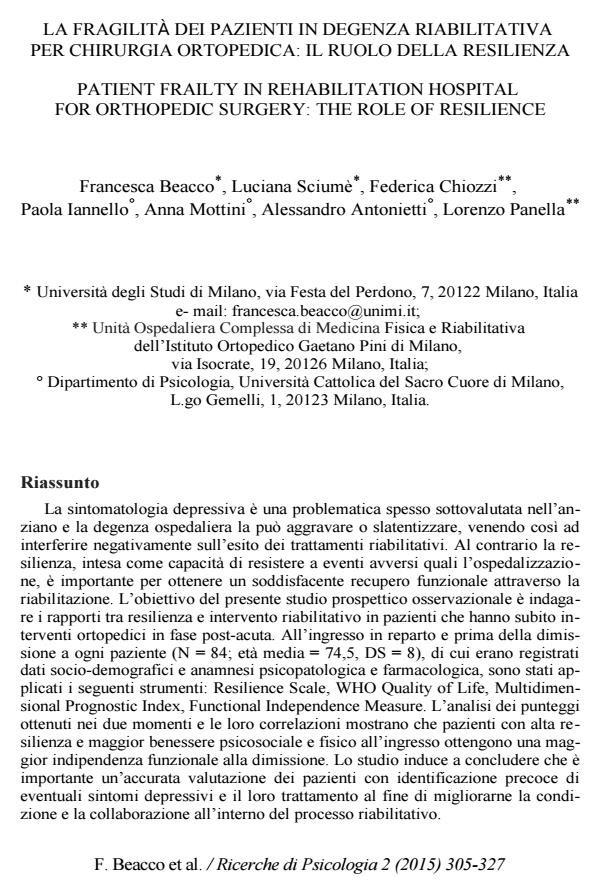La fragilità dei pazienti in degenza riabilitativa per chirurgia ortopedica: il ruolo della resilienza
Titolo Rivista RICERCHE DI PSICOLOGIA
Autori/Curatori Francesca Beacco, Luciana Sciumè, Federica Chiozzi, Paola Iannello, Anna Mottini, Alessandro Antonietti, Lorenzo Panella
Anno di pubblicazione 2015 Fascicolo 2015/2
Lingua Italiano Numero pagine 23 P. 305-327 Dimensione file 504 KB
DOI 10.3280/RIP2015-002002
Il DOI è il codice a barre della proprietà intellettuale: per saperne di più
clicca qui
Qui sotto puoi vedere in anteprima la prima pagina di questo articolo.
Se questo articolo ti interessa, lo puoi acquistare (e scaricare in formato pdf) seguendo le facili indicazioni per acquistare il download credit. Acquista Download Credits per scaricare questo Articolo in formato PDF

FrancoAngeli è membro della Publishers International Linking Association, Inc (PILA), associazione indipendente e non profit per facilitare (attraverso i servizi tecnologici implementati da CrossRef.org) l’accesso degli studiosi ai contenuti digitali nelle pubblicazioni professionali e scientifiche.
La sintomatologia depressiva e una problematica spesso sottovalutata nell’anziano e la degenza ospedaliera la puo aggravare o slatentizzare, venendo cosi ad interferire negativamente sull’esito dei trattamenti riabilitativi. Al contrario la resilienza, intesa come capacita di resistere a eventi avversi quali l’ospedalizzazione, e importante per ottenere un soddisfacente recupero funzionale attraverso la riabilitazione. L’obiettivo del presente studio prospettico osservazionale e indagare i rapporti tra resilienza e intervento riabilitativo in pazienti che hanno subito interventi ortopedici in fase post-acuta. All’ingresso in reparto e prima della dimissione a ogni paziente (N = 84; eta media = 74,5, DS = 8), di cui erano registrati dati socio-demografici e anamnesi psicopatologica e farmacologica, sono stati applicati i seguenti strumenti: Resilience Scale, WHO Quality of Life, Multidimensional Prognostic Index, Functional Independence Measure. L’analisi dei punteggi ottenuti nei due momenti e le loro correlazioni mostrano che pazienti con alta resilienza e maggior benessere psicosociale e fisico all’ingresso ottengono una maggior indipendenza funzionale alla dimissione. Lo studio induce a concludere che e importante un’accurata valutazione dei pazienti con identificazione precoce di eventuali sintomi depressivi e il loro trattamento al fine di migliorarne la condizione e la collaborazione all’interno del processo riabilitativo.
Parole chiave:Depressione, resilienza, qualita della vita, ortopedia, riabilitazione.
- Le concezioni dell'apprendimento negli anziani ospedalizzati Rosa Cera, Alessandro Antonietti, in RICERCHE DI PSICOLOGIA 4/2019 pp.565
DOI: 10.3280/RIP2018-004002
Francesca Beacco, Luciana Sciumè, Federica Chiozzi, Paola Iannello, Anna Mottini, Alessandro Antonietti, Lorenzo Panella, La fragilità dei pazienti in degenza riabilitativa per chirurgia ortopedica: il ruolo della resilienza in "RICERCHE DI PSICOLOGIA " 2/2015, pp 305-327, DOI: 10.3280/RIP2015-002002